Government Procurement & Contracting Specialists.


We help our government buyers procure more efficiently. We concentrate on professional contracts with a personal touch.
Electrical Power Specialists
Experienced in powering infrastructure through smart procurement er specialise in the acquisition and supply of transformers, generators, and high-capacity power systems for government, industrial, and commercial sectors.
With a comprehensive understanding of technical specifications, vendor management, and regulatory compliance, we lead full-cycle procurement operations from initial requirement assessment and technical evaluation to final delivery, inspection, and contract closure. Our work ensures that critical power infrastructure is delivered on time, within budget, and according to both national and international standards.
I’ve had the opportunity to work closely with federal agencies, public-sector clients, and private enterprises, managing procurement processes for mission-critical equipment such as diesel generators for emergency backup and grid-scale transformers for energy transmission. Each project I take on is handled with meticulous care not only to meet performance targets but also to ensure compliance with safety protocols, cost-efficiency goals, and long-term operational sustainability.
Navigating government procurement landscapes requires strategic thinking, accurate documentation, and precise coordination across various stakeholders. I’m highly familiar with frameworks such as the Federal Acquisition Regulation (FAR) and BAA/BABA rules, and I ensure that every step of the acquisition process from bid solicitation to vendor on-boarding aligns with legal and regulatory requirements.
In addition to my technical proficiency, I bring hands-on experience in contract negotiation, supply chain coordination, and after-sales support, ensuring that clients receive value beyond the point of sale. My relationships with reputable manufacturers and global vendors allow me to source high-quality equipment tailored to specific project needs whether for energy utilities, industrial complexes, or government infrastructure upgrades.
I believe in building trust through transparency, consistency, and a problem-solving mindset. In a field where system failures can lead to significant financial or operational disruptions, I strive to deliver reliable, well-vetted solutions that reduce downtime and maximise performance.
If you are a business owner that would like assistance in obtaining government contracts please get in touch. (Contact info below). We specialize in Small Business (SBA), Buy Indian (ISBEE), Veterans (VOSB and SDVOSB), and Women Owned Small Businesses (WOSB).
As a seasoned small business owner and grant writer with over 35 years of combined professional experience Mr. Robert Fletcher, a USA chemical engineer (LSU-81) has the experience to bring quality products and solutions to our government buyers. To see our grant writing site please visit www.RobertMerrillFletcher.com.


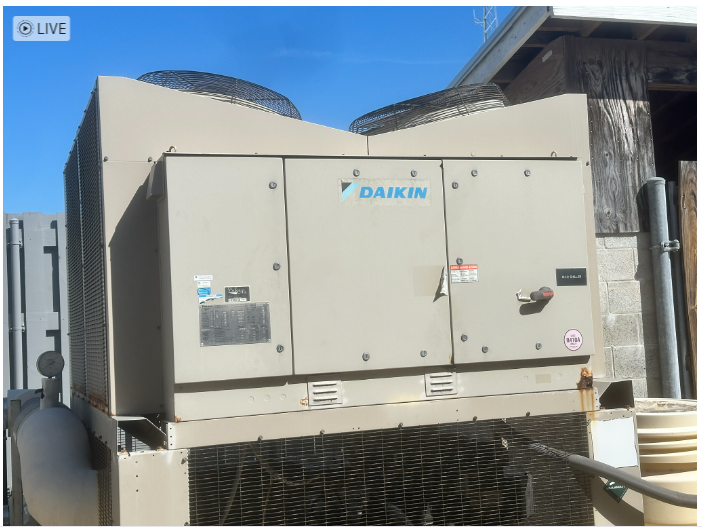

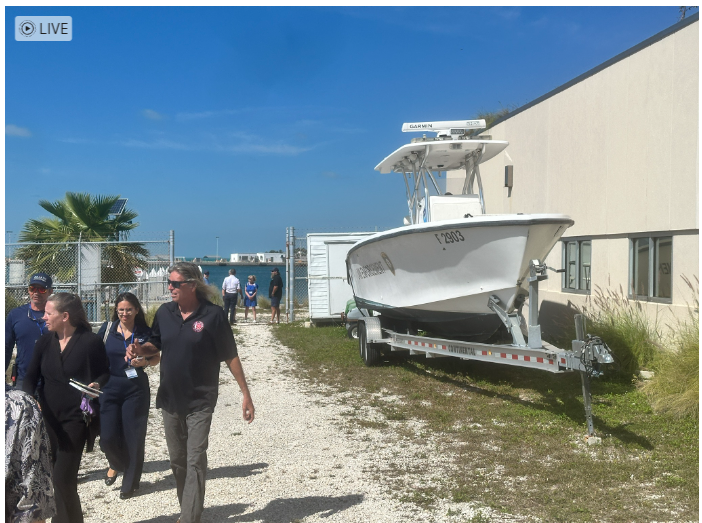

Recent visit to NOAA Key West to Learn Their Contracting Needs. Great people. Great Mission.
At Allied Federal Services, we pride ourselves on building strong, collaborative relationships with our clients, ensuring that their mission objectives are not only met but exceeded. Our track record of success is a testament to our unwavering focus on delivering high-quality solutions that stand the test of time.
Please get in touch with our Robert Merrill Fletcher, ChE our CEO. Call 213.500.7236 (ET) or email Rob@AllFedServe.com.
Our commitment to excellence is evident in every aspect of our work, from meticulous project management to innovative problem-solving. We understand the unique challenges of the federal marketplace and excel at navigating its complexities with precision and professionalism.
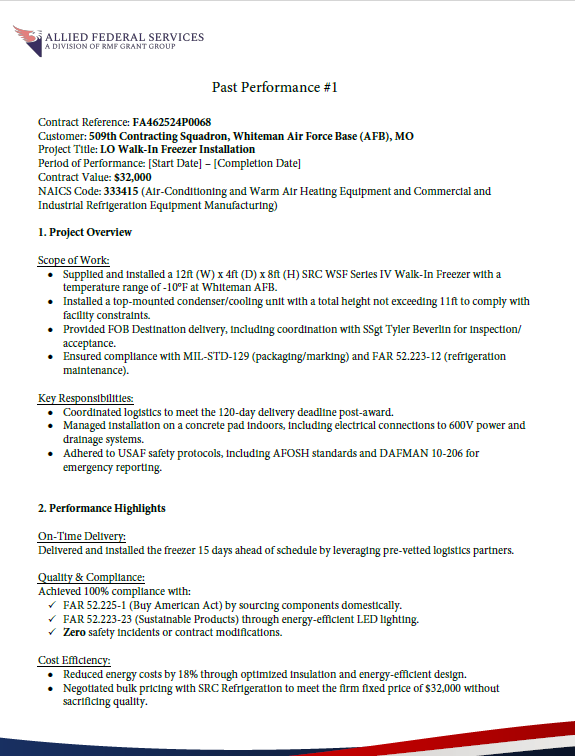
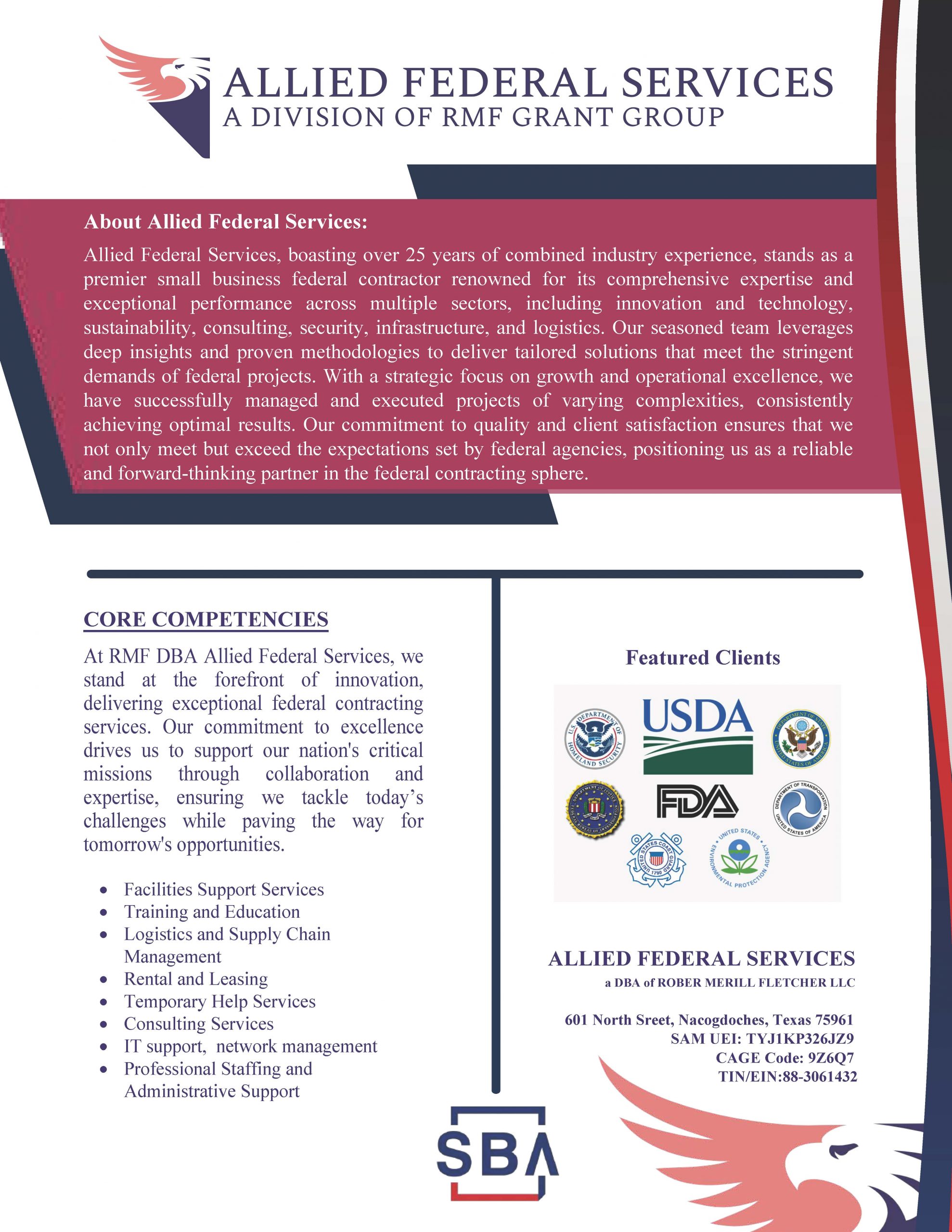
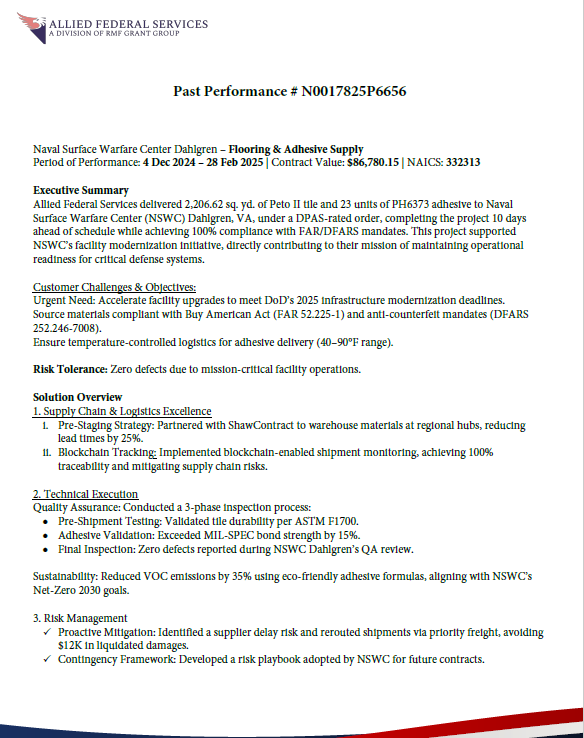
The company also writes technical grants for the DOE, EPA, USDA and more. (www.RobertMerrillFletcher.com)
Government contracting offers an opportunity for small businesses to extend their market presence and enhance profitability. By engaging with government agencies, small enterprises can access a reliable revenue stream while providing essential products and services. This article examines the various facets of government contracting, including the types of offerings that small businesses can deliver, the necessary preparations to submit successful bids, and the resources available to navigate this market effectively. It will also discuss how small businesses can address challenges, capitalize on their unique strengths, and succeed in the government contracting sector.Key Takeaways:
What is government contracting, and how does it benefit small businesses?
.jpg_00.jpeg)
Government contracting encompasses the procedures by which the U.S. government procures goods and services from private sector companies, thereby creating substantial opportunities for small businesses to engage in federal contracts. Various contracting assistance programs provided by government agencies aim to support small businesses in this space.
This sector plays a crucial role in promoting diversity and inclusion by enabling entities such as disadvantaged businesses, women-owned businesses (WOSBs), and veteran-owned businesses (VOSBs) to compete for government contracts. Ultimately, this approach contributes to economic development, job creation, and helps disadvantaged socio-economic groups thrive.
Why should small businesses consider entering the government contracting market?
Small businesses should consider entering the government contracting market due to the extensive range of contracting opportunities that can yield substantial financial benefits and contribute to overall economic development. Understanding Standard Operating Procedures (SOPs) is crucial for successful engagement in this sector.
In a landscape that increasingly emphasizes diversity, these enterprises have a unique opportunity to engage with a lucrative sector that often favors small vendors through set-aside programs. The potential for revenue growth is significant, particularly when contracts are long-term, as this establishes a reliable income stream. Understanding the procurement process is essential, as it enables effective navigation of the complexities involved in securing contracts.
For example, a local IT firm successfully secured a federal contract, resulting in a remarkable 200% increase in its revenue within just one year. Similarly, another small manufacturer was able to obtain contracts with the Department of Defense, which stabilized its finances in a volatile market.
These examples illustrate how small businesses can cultivate meaningful relationships within government sectors, leveraging their agility and innovation to address specific needs while thriving in a competitive environment.
What types of products and services can small businesses offer through government contracts?
Small businesses have the capacity to provide a diverse array of products and services through government contracts. This includes specialized services, unique products, and innovative solutions that align with federal procurement requirements.
These enterprises assume a crucial role across various sectors, including:
- Government Services Administration (GSA): Assisting with procurement and operational needs.
- Information Technology: Delivering cybersecurity services and cloud computing solutions.
- Construction: Participating in building, renovation, and maintenance projects.
- Consulting: Providing expertise in project management, environmental assessments, and strategic planning.
- Manufacturing: Supplying specialized components for defense and aerospace applications.
- Socially and Economically Disadvantaged Business (SEDB): This certification provides access to resources specifically designed for businesses requiring additional support, considering their socio-economic conditions.
- Veteran-Owned Small Business (VOSB): Recognition of military service can significantly enhance a business’s appeal in securing certain contracts.
- Disadvantaged Business Enterprise (DBE): This certification assists small businesses in thriving within state transportation projects and the broader government marketplace.
- Networking events and industry conferences present excellent opportunities for interactions that may lead to future collaborations, including those under the Government Services Administration (GSA) programs.
- Showcasing past performance through case studies can substantially enhance credibility, especially when participating in the Multiple Award Schedule (MAS) program.
- Identify Opportunities: Continuously monitor government procurement portals to discover relevant contract opportunities.
- Review Requirements: Conduct a careful analysis of project specifications and regulations established by government agencies.
- Develop Partnerships: Consider forming alliances with other small businesses or organizations to enhance capabilities and competitiveness.
- Prepare Your Proposal: Devote attention to crafting a clear and compelling proposal that aligns with the specific objectives of the bid.
- Submit on Time: Adhere to all deadlines to ensure your proposal is eligible for evaluation.
- Gather Testimonials: Actively solicit feedback from former clients and partners to share positive experiences.
- Develop Case Studies: Highlight specific projects that showcase problem-solving skills and the ability to exceed expectations.
- Utilize Visual Aids: Incorporate charts or graphs to effectively illustrate project timelines, budgets, and outcomes.
- Conducting routine assessments of contractor performance is vital for identifying areas that require improvement and for maintaining high standards.
- Additionally, preserving detailed records and documentation throughout the duration of the contract is critical for compliance purposes, as it fosters transparency and accountability.
- Fixed-price contracts entail a predetermined price for the entire project, transferring the risk of cost overruns to the contractor. This model can incentivize efficiency and timely delivery.
- Conversely, cost-reimbursement contracts allow businesses to be reimbursed for allowable costs, providing greater flexibility but necessitating stringent monitoring to ensure that expenses remain within budget.
- Mentorship programs that pair emerging entrepreneurs with experienced professionals to cultivate skills and knowledge.
- Networking events that create platforms for small businesses to establish valuable relationships with government agencies and larger firms.
- Workshops designed to educate business owners on navigating the complexities of government contracts, including compliance and proposal writing.
- Visit agency websites regularly
- Participate in relevant workshops
- Subscribe to industry newsletters and updates
It is essential to recognize the importance of subcontracting plans and set-aside contracts for small businesses. These strategies promote equitable access to government contracts, enabling small businesses to compete effectively in the marketplace. Utilizing NAICS codes properly can help small businesses identify suitable opportunities.
For example, a subcontracting plan may allow larger firms to engage small businesses to execute specific components of a project, thus enhancing economic participation. Additionally, sole-source contracts provide small businesses with a distinct opportunity to interact directly with government entities without facing competition, thereby streamlining the procurement process and increasing their visibility within the market.
How can small businesses prepare to bid on government contracts?
To effectively prepare for bidding on government contracts, small businesses must navigate several critical steps, including understanding the bidding process, completing necessary registrations, and submitting comprehensive proposals that align with government standards.
Before engaging in the bidding process, it is essential for small enterprises to develop a well-defined strategy. This includes registering with the System for Award Management (SAM), which is a prerequisite for all government contracts.
Following registration, businesses should conduct a thorough eligibility assessment to ensure compliance with federal regulations, such as Federal Acquisition Regulation (FAR), while also evaluating their capacity to fulfill contract requirements.
It is imperative to recognize the importance of crafting a detailed proposal that accurately highlights qualifications and experience. Conducting extensive market research, including utilizing the dynamic small business search tool, will enable small business owners to identify suitable opportunities and gain a better understanding of their competitors.
Furthermore, possessing a clear understanding of government regulations will significantly enhance their chances of success in this highly competitive environment.
What are the common challenges small businesses face in government contracting?
.jpg_01.jpeg)
Small businesses often encounter numerous challenges in the realm of government contracting. These challenges include navigating complex government regulations, meeting stringent financial requirements such as maintaining accurate financial statements, and establishing a credible track record of contractor performance, all of which can hinder their ability to compete effectively.
These obstacles are particularly significant, as government contracting necessitates a nuanced understanding of compliance standards and the capacity to manage resources effectively. For many entrepreneurs, the rigorous demand for financial documentation, coupled with the absence of prior successful contracts, can create substantial barriers to entry.
Furthermore, small businesses frequently contend with limited access to capital, which exacerbates the difficulties associated with meeting performance benchmarks or securing bonding requirements. Ensuring a strong past performance record can help mitigate some of these challenges.
To address these challenges, it is beneficial for small businesses to cultivate a robust network with experienced contractors, as this can provide invaluable insights into the complexities of the market. Engaging in training programs that focus on government regulations and procurement processes can equip entrepreneurs with the essential knowledge and skills required for successful navigation. Additionally, building relationships with local agencies can lead to mentorship opportunities that enhance credibility and facilitate access to contracts.
By concentrating on these strategic approaches, small businesses can improve their viability in the government contracting sector and position themselves for growth and success.
What resources and assistance are available for small businesses entering government contracting?
Numerous resources and assistance programs are available to aid small businesses in navigating the complexities of government contracting. These include various programs offered by the Small Business Administration (SBA) such as SBA programs, business mentoring initiatives, and support from government agencies.
One of the most notable resources is the HUBZone program, which specifically targets small businesses located in historically underutilized business zones. This program provides various benefits related to government contracting opportunities. Business owners can engage with local SBA offices to access tailored support, which includes workshops and seminars designed to enhance their understanding of complex contracting terminology. This hands-on guidance is crucial for assessing eligibility and comprehending the intricacies of the bidding processes and contracting goals.
Local SBA offices frequently offer one-on-one mentoring that addresses specific business needs, while business mentoring initiatives promote valuable connections and insights from experienced contractors. Utilizing the System for Award Management (SAM) and identifying unique entity identifier requirements are key steps in this mentoring process.
By leveraging these resources, small businesses can enhance their competencies and effectively navigate the procurement landscape, thereby increasing their competitive advantage in securing government contracts. Understanding the Federal Acquisition Regulation (FAR) and other contracting guidelines is critical in this process.
How to identify government contract opportunities for your small business?
Identifying government contract opportunities for small businesses necessitates the utilization of various tools and resources, including comprehensive market research and platforms such as the Dynamic Small Business Search, the Federal Procurement Data System, and the Acquisition Gateway.
To effectively navigate this complex landscape, it is essential to understand the significance of NAICS codes (North American Industrial Classification Standard), as they categorize businesses and identify relevant contracting opportunities. Small business owners should regularly explore these codes to ensure their services align with specific government requirements and the U.S. government standards.
Leveraging available databases, such as SAM.gov and FedBizOpps, can significantly enhance their search for contracts. These platforms provide a wealth of information, including bid opportunities, contract awards, agency profiles, and contract data.
For optimal results, it is advisable to set up alerts for relevant NAICS codes to remain informed. Additionally, participating in industry conferences can facilitate networking and provide insights into upcoming contracts. Consulting local procurement technical assistance centers and SBA programs can offer valuable guidance on navigating the contracting process.
By implementing these strategies, small businesses will be better positioned to discover and capitalize on critical government contract opportunities within the government marketplace effectively.
What certifications or registrations do small businesses need to compete for government contracts?
To compete effectively for government contracts, small businesses must obtain specific certifications and registrations, including a Unique Entity Identifier and completion of the System for Award Management (SAM) registration process, while adhering to applicable government regulations such as the Federal Acquisition Regulation (FAR).
Along with these foundational requirements, certifications such as the Small Business Administration (SBA) 8(a), Women-Owned Small Business (WOSB) status, and participation in the HUBZone program can significantly enhance a small firm’s credibility. These designations are not merely formalities; they considerably increase a business’s opportunities to participate in federal procurements, as many government agencies have established specific contracting goals for these categories.
As small enterprises navigate the complexities of government contracting, possessing these certifications not only legitimizes their status but also facilitates access to specialized contracts aligned with their expertise.
By obtaining these endorsements, small businesses not only ensure compliance with regulations but also enhance their visibility and competitiveness in a dynamic government marketplace. Moreover, they align their practices with business development goals and Standard Operating Procedures.
How can small businesses improve their chances of winning government contracts?
.jpg_10.jpeg)
Small businesses can significantly improve their prospects of securing government contracts by cultivating a strong reputation for contractor performance, submitting high-quality proposals, and maintaining transparent financial statements that demonstrate capability and reliability. Additionally, understanding the roles and responsibilities of contractors can further enhance their success.
Along with these foundational elements, small enterprises should prioritize the development of strategic relationships with government buyers, and leverage their contractor experiences to further enhance their standing in a competitive bidding environment.
Adhering to stringent quality assurance guidelines not only fulfills compliance requirements but also reflects a commitment to excellence. Accurate financial reporting is crucial in this context, as it fosters trust among stakeholders and illustrates a business’s ability to manage resources effectively.
By integrating these strategies, small businesses can more effectively position themselves to secure lucrative government contracts and promote sustained growth.
What is the process for bidding on government contracts as a small business?
Bidding on government contracts as a small business necessitates a structured approach that encompasses understanding the procurement process, preparing detailed proposal submissions, and adhering to specified deadlines and requirements. This often involves understanding the Request For Proposal (RFP) process.
A comprehensive understanding of the intricacies of the bidding process is essential for success. This journey often commences with thorough research into specific government needs and industry standards, allowing businesses to tailor their proposals effectively. Additionally, adhering to SAM registration and other registration requirements is crucial. Small enterprises should prioritize the following steps:
Compliance with contracting guidelines is imperative, as is a profound understanding of the unique challenges faced by government buyers. A well-prepared proposal not only satisfies the requirements but also resonates with the preferences of these buyers, significantly influencing the outcome of the bidding process.
How can small businesses leverage past performance and experience in government contracting?
Leveraging past performance and relevant contractor experiences is essential for small businesses engaged in government contracting, as it can significantly impact bidding success and establish credibility with government buyers.
To effectively engage potential clients, small businesses should go beyond simply listing their achievements. They must articulate a compelling narrative that demonstrates how their successes in previous projects can provide value for future initiatives. This involves identifying key milestones that emphasize their capabilities and commitment, as recognized by the Office of Government Contracting.
By employing these strategies, small businesses can construct a narrative that not only emphasizes their reliability but also vividly illustrates their potential contributions to future projects.
What are the best practices for managing government contracts effectively?
Effective management of government contracts necessitates that small businesses adopt best practices that ensure compliance with quality assurance standards and government regulations, while also optimizing the roles and responsibilities of contractors, including the implementation of robust business systems.
To achieve this, it is essential to maintain clear and open lines of communication with all stakeholders involved, including government officials and team members. Regular meetings and updates are instrumental in ensuring that everyone remains aligned and informed about any changes to the project scope or expectations. Adherence to quality assurance protocols is of utmost importance; this includes the implementation of structured processes that monitor deliverables at each stage.
By integrating these practices, small businesses can significantly enhance their effectiveness in managing government contracts.
How do payment terms and pricing work in government contracts for small businesses?
.jpg_11.jpeg)
Understanding payment terms and pricing structures in government contracts is essential for small businesses, as these factors significantly influence cash flow, financial opportunities, and overall financial health in federal procurement.
In the realm of government contracts, various pricing models present unique challenges and opportunities.
The choice between these two contract types can have a significant impact on the awarding process. Therefore, understanding the implications of pricing strategies in the bidding process is crucial. Meeting financial requirements is not merely a procedural formality; it forms the foundation of effective contract management and fosters enduring business relationships.
What role do small business advocates play in government contracting opportunities?
Small business advocates play a crucial role in facilitating government contracting opportunities by providing contracting assistance, promoting economic development, and ensuring that small businesses are informed about available SBA programs, including the HUBZone Program, the Women-Owned Small Business (WOSB) Program, and initiatives for Small Disadvantaged Businesses and Veteran-Owned Small Businesses.
Their influence extends well beyond mere guidance; they actively engage in initiatives aimed at fostering an inclusive environment where diverse enterprises can thrive. These advocates underscore the importance of connecting small businesses with essential resources, such as:
They support initiatives that prioritize minority and women-owned businesses, ensuring that the contracting landscape is equitable and accessible for all, thereby enhancing both economic growth and community resilience.
How can small businesses stay informed about changes in government contracting regulations, which are governed by the Federal Acquisition Regulation,?
To remain informed about changes in government contracting regulations, small businesses must actively engage with government agencies and utilize available resources to monitor updates that impact the procurement process.
Maintaining vigilance in this area is crucial, as regulatory changes can significantly affect operations, compliance costs, and competitive positioning. Small entities should prioritize ongoing education and awareness not only to ensure compliance but also to effectively navigate the complexities of the contracting environment. Key government agencies, such as the Small Business Administration (SBA) and the General Services Administration (GSA), provide valuable resources, including webinars, training sessions, and guidance documents.
To facilitate this engagement, small businesses are encouraged to:
Platforms such as the System for Award Management (the System for Award Management (SAM).gov) and the Federal Register are also critical for tracking real-time updates. By utilizing these resources, small businesses can ensure they are well-equipped to adapt to changing regulations and enhance their competitiveness.
What are the long-term benefits of engaging in government contracting for small businesses?
Engaging in government contracting offers numerous long-term benefits for small businesses, including enhanced stability, access to a variety of contracting opportunities, and contributions to overall economic development.
Businesses that successfully navigate this landscape often experience consistent revenue streams that help buffer them against economic downturns. By securing contracts with government entities, a small business can anticipate a steady cash flow, allowing for investment in innovation and expansion.
The potential for growth in this sector is significant, as many government projects require ongoing services, which can foster long-term partnerships. Establishing a presence within this marketplace enhances a business’s credibility and reputation. For instance, companies such as XYZ Tech and ABC Logistics have effectively leveraged government contracts to scale their operations and achieve substantial visibility.
These examples illustrate how small enterprises can thrive, cultivate essential connections, and establish a strong foothold by consistently delivering on government contracts. Ultimately, participation in government contracting not only provides immediate financial benefits but also paves the way for sustainable growth and long-term success.
Frequently Asked Questions
1. What is government contracting and how can it benefit my small business?
Government contracting is the process of purchasing goods or services from small businesses by federal, state, or local government agencies. This can be a valuable channel for small businesses as it provides a stable and reliable source of revenue, as well as the opportunity to work with government agencies and establish long-term relationships.
2. What are the qualifications for a small business to participate in government contracting?
In order to participate in government contracting, as outlined by the Office of Government Contracting, your business must meet certain criteria set by the Small Business Administration (SBA). This includes being a small business as defined by SBA size standards, and classified under appropriate NAICS codes, having the necessary resources and capabilities to fulfill government contracts, and being registered with the System for Award Management (SAM) database.
3. How can I find government contracting opportunities for my small business?
One way to find government contracting opportunities is through the SBA’s Sub-Net and the Federal Business Opportunities (FedBizOpps) database, which lists all current federal contracting opportunities. You can also reach out to your local Procurement Technical Assistance Center (PTAC) for assistance in finding and bidding on government contracts.
4. Are there any set-aside programs for small businesses in government contracting?
Yes, the government has set-aside programs to increase the participation of small businesses in government contracting. These include the 8(a) Business Development Program for socially and economically disadvantaged businesses, the HUBZone Program for businesses located in historically underutilized business zones, and the Women-Owned Small Business (WOSB) Program.
5. What are the benefits of participating in government contracting for my small business?
Besides the stable and reliable source of revenue, participating in government contracting can also help your small business gain credibility and visibility in the marketplace. It can also provide access to valuable resources and training opportunities through government agencies and prime contractors.
6. How can I ensure my small business is successful in government contracting?
In order to be successful in government contracting, it is important to thoroughly research and understand the requirements and processes involved. It is also crucial to establish strong relationships with government agencies and prime contractors, and to continuously improve and diversify your business offerings to meet the changing needs of the government market.
